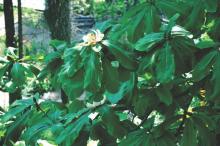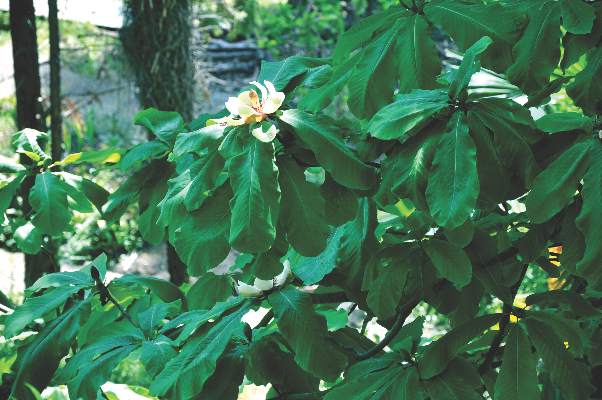User login
SAN FRANCISCO – Twelve weeks of treatment with a novel botanical drug extracted from Magnolia officinalis safely and significantly reduced hepatic fat content in a dose-dependent manner among patients in a randomized, placebo-controlled phase II trial.
In 73 subjects with nonalcoholic fatty liver disease (NAFLD) who were randomized to receive 300 mg daily of the botanical drug (tablet), 100 mg daily, or placebo; hepatic fat content after 12 weeks was reduced by 12.14% with 300 mg daily and by 3.21% with 100 mg daily; fat content increased by 7.56% with placebo, Dr. Yeon Kim reported at the annual meeting of the American Association for the Study of Liver Diseases.
Serum aspartate aminotransferase and alanine aminotransferase were also reduced in the active treatment groups, and other factors, including cholesterol, triglycerides, free fatty acids, homeostatic model assessment (HOMA) insulin resistance, and body mass index, remained unchanged in both the treatment and placebo groups.
No drug-related safety issues occurred during the study, said Dr. Kim of Huons Co. Ltd., Ansan, South Korea.
Magnolia officinalis is a traditional herbal medicine that has been used to treat various liver diseases. Given the demand for new drugs for the treatment of NAFLD, Dr. Kim and his colleagues aimed to evaluate the effect and safety of the botanical tablet for the treatment of NAFLD.
Subjects were diagnosed with NAFLD by ultrasonic examination, and treatment was given twice daily for 12 weeks. Pre- and posttreatment hepatic fat content was measured using magnetic resonance spectroscopy.
The findings show that even with short treatment duration, this novel botanical drug was associated with hepatic fat content reduction without any negative lipid profile, body mass index change, or adverse effects, Dr. Kim said, concluding that larger extended trials to assess its long-term efficacy are warranted.
Dr. Kim reported having no disclosures.
SAN FRANCISCO – Twelve weeks of treatment with a novel botanical drug extracted from Magnolia officinalis safely and significantly reduced hepatic fat content in a dose-dependent manner among patients in a randomized, placebo-controlled phase II trial.
In 73 subjects with nonalcoholic fatty liver disease (NAFLD) who were randomized to receive 300 mg daily of the botanical drug (tablet), 100 mg daily, or placebo; hepatic fat content after 12 weeks was reduced by 12.14% with 300 mg daily and by 3.21% with 100 mg daily; fat content increased by 7.56% with placebo, Dr. Yeon Kim reported at the annual meeting of the American Association for the Study of Liver Diseases.
Serum aspartate aminotransferase and alanine aminotransferase were also reduced in the active treatment groups, and other factors, including cholesterol, triglycerides, free fatty acids, homeostatic model assessment (HOMA) insulin resistance, and body mass index, remained unchanged in both the treatment and placebo groups.
No drug-related safety issues occurred during the study, said Dr. Kim of Huons Co. Ltd., Ansan, South Korea.
Magnolia officinalis is a traditional herbal medicine that has been used to treat various liver diseases. Given the demand for new drugs for the treatment of NAFLD, Dr. Kim and his colleagues aimed to evaluate the effect and safety of the botanical tablet for the treatment of NAFLD.
Subjects were diagnosed with NAFLD by ultrasonic examination, and treatment was given twice daily for 12 weeks. Pre- and posttreatment hepatic fat content was measured using magnetic resonance spectroscopy.
The findings show that even with short treatment duration, this novel botanical drug was associated with hepatic fat content reduction without any negative lipid profile, body mass index change, or adverse effects, Dr. Kim said, concluding that larger extended trials to assess its long-term efficacy are warranted.
Dr. Kim reported having no disclosures.
SAN FRANCISCO – Twelve weeks of treatment with a novel botanical drug extracted from Magnolia officinalis safely and significantly reduced hepatic fat content in a dose-dependent manner among patients in a randomized, placebo-controlled phase II trial.
In 73 subjects with nonalcoholic fatty liver disease (NAFLD) who were randomized to receive 300 mg daily of the botanical drug (tablet), 100 mg daily, or placebo; hepatic fat content after 12 weeks was reduced by 12.14% with 300 mg daily and by 3.21% with 100 mg daily; fat content increased by 7.56% with placebo, Dr. Yeon Kim reported at the annual meeting of the American Association for the Study of Liver Diseases.
Serum aspartate aminotransferase and alanine aminotransferase were also reduced in the active treatment groups, and other factors, including cholesterol, triglycerides, free fatty acids, homeostatic model assessment (HOMA) insulin resistance, and body mass index, remained unchanged in both the treatment and placebo groups.
No drug-related safety issues occurred during the study, said Dr. Kim of Huons Co. Ltd., Ansan, South Korea.
Magnolia officinalis is a traditional herbal medicine that has been used to treat various liver diseases. Given the demand for new drugs for the treatment of NAFLD, Dr. Kim and his colleagues aimed to evaluate the effect and safety of the botanical tablet for the treatment of NAFLD.
Subjects were diagnosed with NAFLD by ultrasonic examination, and treatment was given twice daily for 12 weeks. Pre- and posttreatment hepatic fat content was measured using magnetic resonance spectroscopy.
The findings show that even with short treatment duration, this novel botanical drug was associated with hepatic fat content reduction without any negative lipid profile, body mass index change, or adverse effects, Dr. Kim said, concluding that larger extended trials to assess its long-term efficacy are warranted.
Dr. Kim reported having no disclosures.
AT THE LIVER MEETING 2015
Key clinical point: Twelve weeks of treatment with a novel botanical drug extracted from Magnolia officinalis safely and significantly reduced hepatic fat content in a dose-dependent manner among patients in a randomized, placebo-controlled phase II trial.
Major finding: Hepatic fat content was reduced by 12.14% and 3.21% with 300 and 100 mg daily of the botanical, respectively, compared with an increase of 7.56% with placebo.
Data source: A randomized, placebo-controlled phase II study of 73 patients.
Disclosures: Dr. Kim reported having no disclosures.

